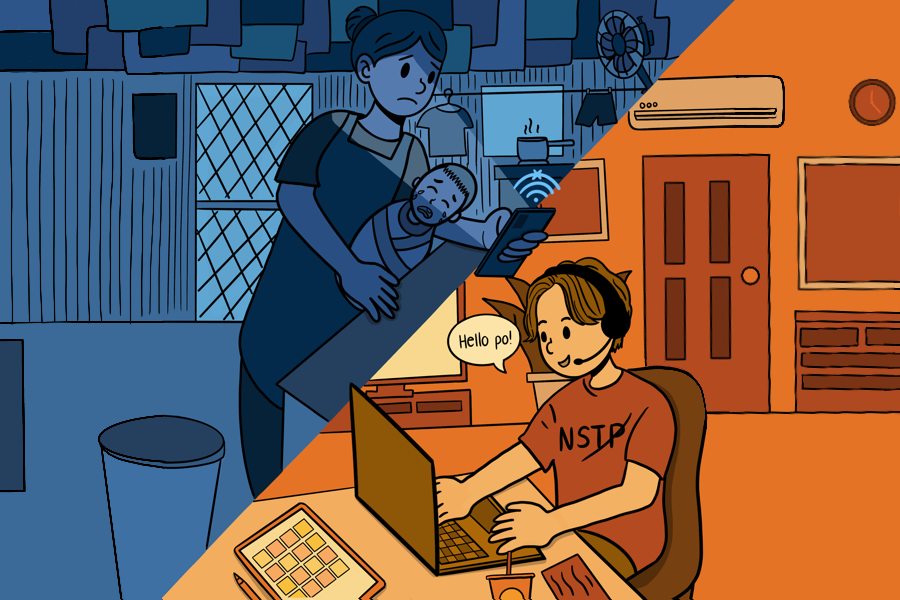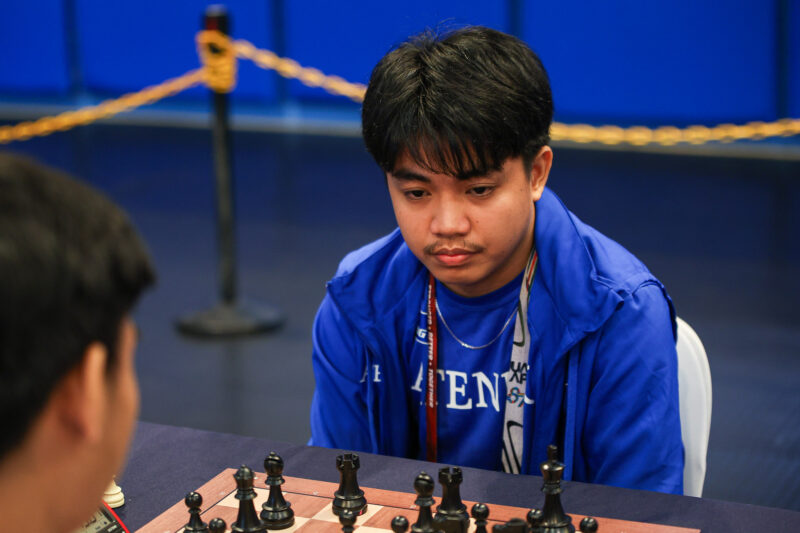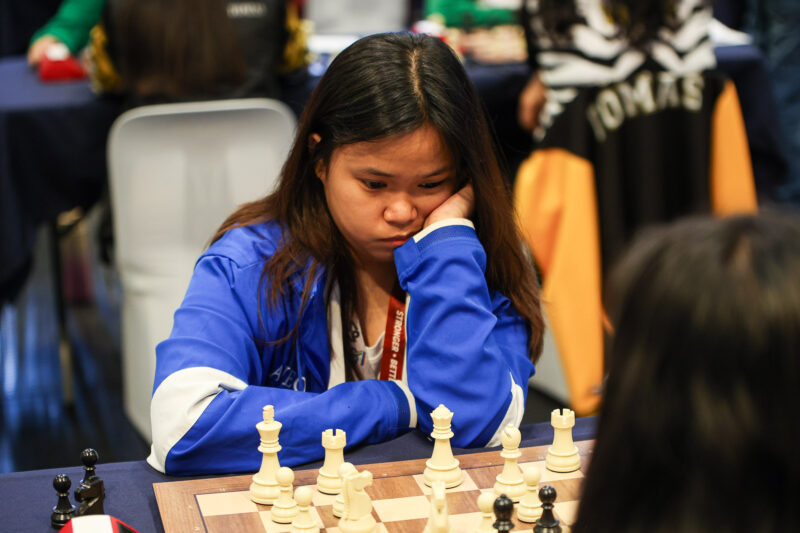IN BUSTLING online classes, professors are expected to quickly adapt their curriculum to the demands of remote learning. No subject was exempt from the online migration—even the University’s National Service Training Program (NSTP). NSTP falls under the Loyola Schools’ Integrated Ateneo Formation (InAF) Program, which aims to form “persons-for-and-with-others who will contribute meaningfully to the transformation of Philippine society” through its yearly mandated programs.
Headed by the Office for Social Concern and Involvement (OSCI), the University’s NSTP consists of two programs: Punla (NSTP 11) and Bigkis (NSTP 12). Both programs are made up of six modules, one or two of which are reserved for online community engagements sessions. These sessions come in the form of calls between students and their assigned communities.
However, questions regarding the program’s implementation in an online setting begin to surface as NSTP classes continue to be taught in a detached online environment.
Longing to do more
According to OSCI Director Ophalle Alzona-Pornela, the office confronted several challenges in fully transitioning both programs online. “There are old partners that would have been a good fit for our activities, but do not have stable internet connections,” she explains.
NSTP 11 student Regina Louise Caburnay shares her appreciation for the online course. “What’s nice about the program is that they provide us with opportunities for us to really get to know what certain laborers have been experiencing this pandemic,” she says.
Despite this, uncertainty with NSTP remains, and some students have expressed worries on the extent of their learning given the limited interactions. Caburnay feels that she missed out on more enriching experiences with the community compared to older batches who participated in the on-site NSTP.
Assistant Director for NSTP 11 Carlos Granados Jr. shares that OSCI received similar feedback from other students who underwent their course. “For NSTP 11, students usually were surprised that they have learned a lot even if it was designed to be an online course. Some students also wished that there would be more opportunities for online engagement,” he says.
Lyka Pacleb, a junior who underwent the online NSTP 12 course, echoes similar sentiments. She says that the online interactions she had with her partner community, the University of the Philippines Kampus-Kmart Jeepney Operators and Drivers Association (UP-KK-JODA), made her long to aid them further.
Pacleb says that her group* conducted two online interviews with the UP-KK-JODA jeepney operators. Based on these interviews, they designed a social media campaign as an action plan. By the end of their interactions, however, these plans were presented to the community but did not reach fruition. In addition, the decision to implement the campaign was ultimately left to the group.
However, such action plans are not necessarily scrapped once engagements conclude. Assistant Director for NSTP 12 Anitta Nuevo explains that some project proposals will be turned over to their partner communities, while others will be further built upon by partnering departments. “We also encourage our students to pursue their project proposals as their thesis, or as an advocacy project,” Nuevo adds.
Then and now
Pacleb also raises concerns on the UP-KK-JODA drivers’ possible struggles during online NSTP. She cites one of the drivers her group interacted with who was working while in-call. Besides this, she expresses her worries with regard to the community’s internet accessibility.
UP-KK-JODA members Ricardo dela Cruz and Mac Casinas confirm that communication issues such as unclear audio hampered the engagements. “‘Yung salita imbis na dire-diretso mo maintindihan ang sinasabi na salita, napuputol ang salita dahil […] hindi ho pare-pareho yung ginagamit naming lakas ng internet,” says Dela Cruz.
(Instead of being able to directly understand what the students are saying, what they say becomes unclear because of disparities in our internet connection.)
Although the drivers express their appreciation for the opportunity to share their narratives with students even in the online setting, Dela Cruz and Casinas reiterate their preference for on-site NSTP. “Namimiss ko talaga yung mga estudyante nakikipagbiruan sa amin, nagkakaroon ng tawanan, selfie-selfie. Hindi katulad dito, parang puro seryo-seryoso ang usapan dito,” Dela Cruz says.
(I really miss having the students joke around with us, laugh with us, take selfies with us. It’s not like the online NSTP where our interactions seem so serious.)
To improve online NSTP for students and partner communities alike, Dela Cruz hopes that students can physically meet up with communities again in appropriate conditions so that both parties can better communicate with each other. Pacleb expresses her desire for student projects to be actualized, emphasizing the importance of taking action on community issues after gaining awareness.
A two-way engagement
With reservations coming from the students’ and community’s sides, Development Studies associate professor Mark Abenir mentions that reciprocity in community engagements is important. “Students get something out of the engagement, which basically is a learning experience in serving other people and of course…the service rendered by the student [should be] helpful and useful for the community in the long-term,” he states.
Moreover, he posits that community engagements must be people-centered. “Empowerment of our partners is very important, and empowerment happens if they (our partners) have a participation in the creation of a project,” Abenir adds. He explains that communication between students and partners must be constant, such that a feedback system is present.
OSCI assures that they are open to feedback from both students and partner communities. “We take into account the feedback we received from our students and partners. Knowing how we can better serve them is important to us,” says Granados.
Alzona-Pornela adds that they receive feedback from partner communities for urgent concerns after each engagement, and once more at the end of the quarter and semester. “We’ll also make necessary adjustments to the conduct of our online engagements based on feedback of all stakeholders,” she says.
However, Abenir holds apprehensions towards gathering feedback within the limited time frame of a quarter.“Partners would not tell you that [honest feedback] because there is a power dynamic there. For example, they would say ‘Ateneo [is] partnering with us!’ Because for them, it is a privilege,” he says.
This power dynamic urges students to examine their privilege and look beyond mere interaction with partner communities. “Aside from being…aware and encouraged to think about the community’s situation…what can you do to actually change it? What can you do to actually solve the problem that these communities are facing?” Pacleb says in a mix of English and Filipino. “Students are willing to help out if they have the opportunity.”
With communities facing the combined effects of natural disasters, socioeconomic struggles, and the COVID-19 pandemic, the students are encouraged to be socially aware and action-oriented. Hopefully, adjustments made to NSTP’s future modules help enhance its capacity for both student formation and community development.
*Editor’s Note: Inquiry Editor Jean Mangaluz and Inquiry Staffer Manolo G. Soliven were members of Lyka Pacleb’s NSTP 12 group. Mangaluz and Soliven were largely excluded from interviews with Pacleb, Dela Cruz, and Casinas to ensure objectivity.







